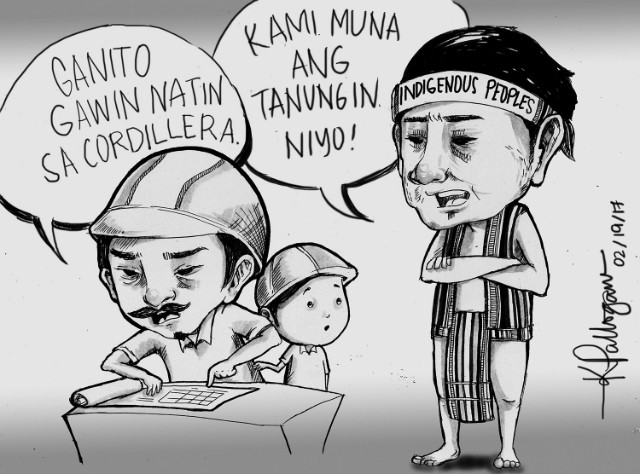The Cordillera is a blessed region with its vast tracks of natural resources awaiting to be responsibly developed to spur sustainable economic development for the well-being of its peoples. One cause of rampant migration to the urban centers, particularly Baguio city, is the lack of economic activities in the rural areas that can provide adequate employment opportunities and sources of livelihood. Aside from having the lowest share of the national income for local governments, the Cordillera also receives a very small share of the government’s infrastructure funds despite the need for numerous roadlines to connect the provinces for the easier entry of services and investments.
The region’s population is 92 percent indigenous peoples (IPs) who belong to different ethnolinguistic groups residing in the region’s six provinces and two cities. Republic Act (RA) 8371 or the Indigenous Peoples Rights Act (IPRA) empowers IPs to be consulted in the implementation of projects that will lead to the exploitation, development, and utilization of natural resources that are located within their ancestral domain and that similar projects cannot proceed without the consent of the affected IPs. This remedies the previous practice of ancestral domains being appropriated for corporate and state projects often forcibly evicting indigenous peoples from their homelands, depriving them of their livelihoods and desecrating their sacred sites. The historical injustice suffered by the Ambuclao and Binga people are lessons we bear when considering development projects. Long-term impacts are now being felt by upstream communities who are now experiencing upstream siltation.
From 41 percent paved national roads in 2010 in the region to about 80 percent now, the percentage of paved national roads region-wide significantly improved through the huge investments infused by the previous administration in terms of concreting national roads and building more roads leading to the countryside opening more opportunities for solid economic growth. Infrastructure development is one of the major factors in spurring economic activities in the countryside because prospective investors will have easier access in bringing their businesses to their desired areas without undue interruption. One of the major beneficiaries of interconnectivity in the region through the building of access roads is Apayao. The province’s lower and upper towns are already inter-connected with the completion of major interior projects in this last frontier of ecology in the region.
Apayao has rich natural resources that when exploited and developed could make the province one of the most developed local governments in the region if it will be given its due share of the operation of industries that will operate locally.
This is an opportune time for the local government units to develop the potentials of the province for economic growth without, of course, sacrificing the environment which is the source of all this wealth which was preserved and passed on to the present generations by our ancestors. Apayao IPs must learn to collectively negotiate equitable benefit-sharing arrangements through proper determination of the long-term costs and benefits of such developments with due consideration for the lives of future generations.
May we remind them they must not allow self-serving fellow IPs to negotiate on their behalf; that they must not be rushed into making decisions which may compromise future generations.
Let us learn to use proven indigenous ways in settling conflicts that arise when development projects are introduced in our domain and teach our children the importance of conflict resolution through community-proven ways in peacefully settling conflicts that will result in the benefit of the community.
Let us make sure that IPs directly and collectively benefit from development projects in their domain and investors to respect IP decision-making processes. Development projects should strengthen community solidarity and relations and not be the cause of conflicts.
More importantly, may we all be reminded of the essence of free prior and informed consent (FPIC) for indigenous peoples. From the Office of the High Commissioner for Human Rights of the United Nations, FPIC means the following:
- Free implies that there is no coercion, intimidation or manipulation.
- Prior implies that consent is to be sought sufficiently in advance of any authorization or commencement of activities and respect is shown to time requirements of indigenous consultation/consensus processes.
- Informed implies that information is provided that covers a range of aspects, including the nature, size, pace, reversibility and scope of any proposed project or activity; the purpose of the project as well as its duration; locality and areas affected; a preliminary assessment of the likely economic, social, cultural and environmental impact, including potential risks; personnel likely to be involved in the execution of the project; and procedures the project may entail. This process may include the option of withholding consent.
- Consultation and participation are crucial components of a consent process.
It is only when the above conditions are fulfilled that we can say the consent of IPs to a development project is willfully given. FPIC means to give or to deny consent.














